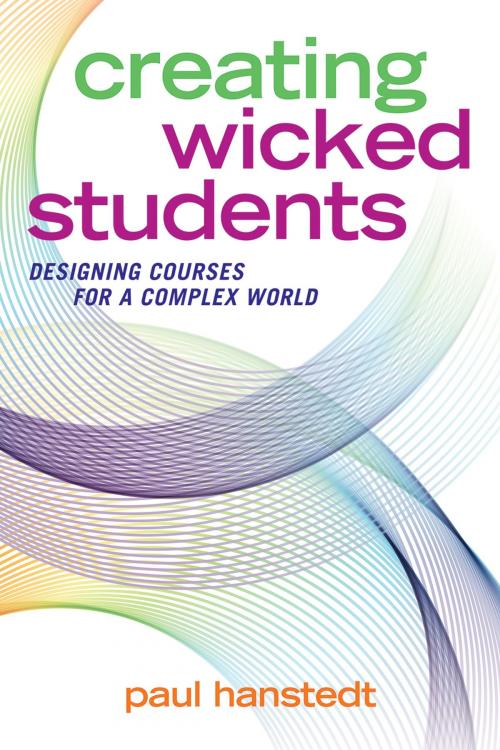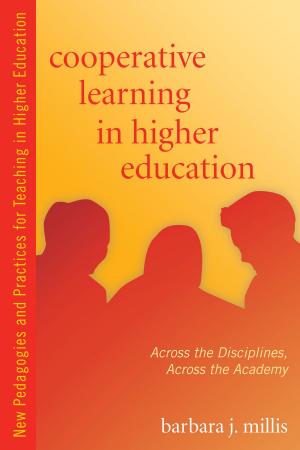Creating Wicked Students
Designing Courses for a Complex World
Nonfiction, Reference & Language, Education & Teaching, Higher Education| Author: | Paul Hanstedt | ISBN: | 9781620366998 |
| Publisher: | Stylus Publishing | Publication: | May 31, 2018 |
| Imprint: | Stylus Publishing | Language: | English |
| Author: | Paul Hanstedt |
| ISBN: | 9781620366998 |
| Publisher: | Stylus Publishing |
| Publication: | May 31, 2018 |
| Imprint: | Stylus Publishing |
| Language: | English |
In Creating Wicked Students, Paul Hanstedt argues that courses can and should be designed to present students with what are known as “wicked problems” because the skills of dealing with such knotty problems are what will best prepare them for life after college. As the author puts it, “this book begins with the assumption that what we all want for our students is that they be capable of changing the world….When a student leaves college, we want them to enter the world not as drones participating mindlessly in activities to which they’ve been appointed, but as thinking, deliberative beings who add something to society.”
There’s a lot of talk in education these days about “wicked problems”—problems that defy traditional expectations or knowledge, problems that evolve over time: Zika, ISIS, political discourse in the era of social media. To prepare students for such wicked problems, they need to have wicked competencies, the ability to respond easily and on the fly to complex challenges. Unfortunately, a traditional education that focuses on content and skills often fails to achieve this sense of wickedness. Students memorize for the test, prepare for the paper, practice the various algorithms over and over again—but when the parameters or dynamics of the test or the paper or the equation change, students are often at a loss for how to adjust.
This is a course design book centered on the idea that the goal in the college classroom—in all classrooms, all the time—is to develop students who are not just loaded with content, but capable of using that content in thoughtful, deliberate ways to make the world a better place. Achieving this goal requires a top-to-bottom reconsideration of courses, including student learning goals, text selection and course structure, day-to-day pedagogies, and assignment and project design. Creating Wicked Students takes readers through each step of the process, providing multiple examples at each stage, while always encouraging instructors to consider concepts and exercises in light of their own courses and students.
In Creating Wicked Students, Paul Hanstedt argues that courses can and should be designed to present students with what are known as “wicked problems” because the skills of dealing with such knotty problems are what will best prepare them for life after college. As the author puts it, “this book begins with the assumption that what we all want for our students is that they be capable of changing the world….When a student leaves college, we want them to enter the world not as drones participating mindlessly in activities to which they’ve been appointed, but as thinking, deliberative beings who add something to society.”
There’s a lot of talk in education these days about “wicked problems”—problems that defy traditional expectations or knowledge, problems that evolve over time: Zika, ISIS, political discourse in the era of social media. To prepare students for such wicked problems, they need to have wicked competencies, the ability to respond easily and on the fly to complex challenges. Unfortunately, a traditional education that focuses on content and skills often fails to achieve this sense of wickedness. Students memorize for the test, prepare for the paper, practice the various algorithms over and over again—but when the parameters or dynamics of the test or the paper or the equation change, students are often at a loss for how to adjust.
This is a course design book centered on the idea that the goal in the college classroom—in all classrooms, all the time—is to develop students who are not just loaded with content, but capable of using that content in thoughtful, deliberate ways to make the world a better place. Achieving this goal requires a top-to-bottom reconsideration of courses, including student learning goals, text selection and course structure, day-to-day pedagogies, and assignment and project design. Creating Wicked Students takes readers through each step of the process, providing multiple examples at each stage, while always encouraging instructors to consider concepts and exercises in light of their own courses and students.















